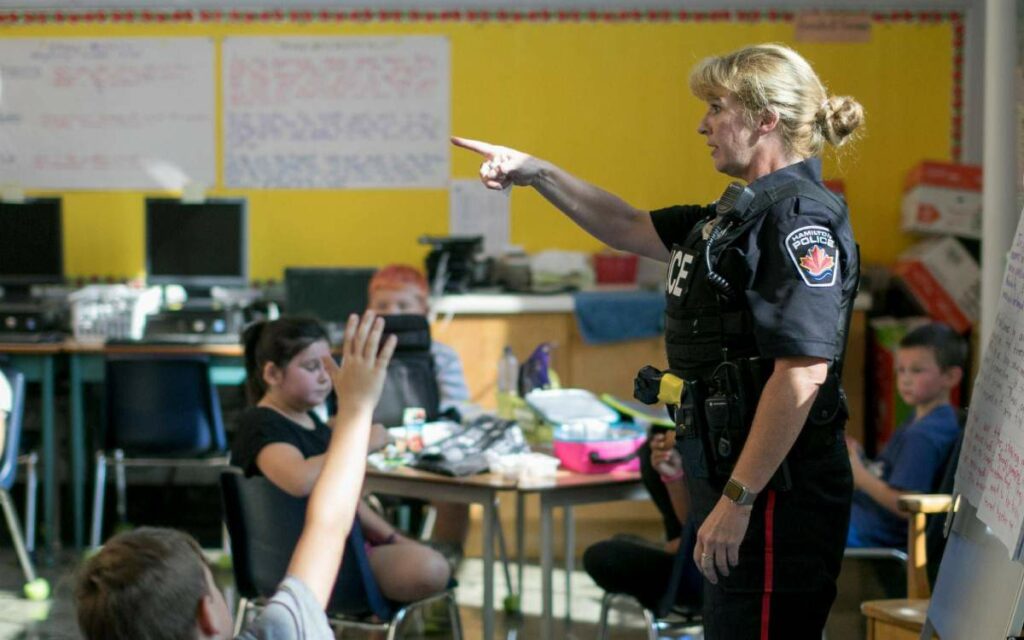The Role of Law Enforcement in Preventing and Responding to Bullying

Law Enforcement in Preventing Bullying
Law enforcement plays a crucial role in preventing bullying by establishing a visible presence in schools and communities, enforcing anti-bullying laws, and collaborating with other stakeholders.
Establishing a visible presence:
A visible law enforcement presence in schools and communities sends a clear message that bullying will not be tolerated. Officers can patrol school grounds, attend school events, and engage with students to build relationships and trust. This presence deters potential bullies and reassures victims that help is available.
Enforcing anti-bullying laws:
Law enforcement officers are responsible for enforcing anti-bullying laws, which vary by jurisdiction. These laws define bullying behaviors, establish penalties for perpetrators, and provide legal recourse for victims. By enforcing these laws, officers hold bullies accountable for their actions and send a strong message that bullying will not be tolerated.
Collaborating with other stakeholders:
Law enforcement agencies should collaborate with schools, parents, and community organizations to develop comprehensive anti-bullying strategies. This collaboration involves sharing information, providing training, and coordinating responses to bullying incidents. By working together, these stakeholders can create a united front against bullying.
The Role of Law Enforcement in Responding to Bullying
When bullying occurs, law enforcement officers play a critical role in responding effectively and appropriately. Their responsibilities include investigating incidents, providing support to victims, and holding perpetrators accountable.
Investigating incidents:
When a bullying incident is reported, law enforcement officers should conduct a thorough investigation to gather evidence, identify witnesses, and determine the nature and extent of the bullying. This investigation helps to establish the facts of the case and inform appropriate legal action.
Providing support to victims:
Law enforcement officers should provide support to victims of bullying, treating them with empathy and respect. They can provide information about legal options, connect victims with resources, and ensure their safety. By supporting victims, officers help them to feel empowered and less alone.
Holding perpetrators accountable:
Based on the results of their investigation, law enforcement officers should hold perpetrators accountable for their actions. This may involve issuing citations, making arrests, or referring cases to juvenile authorities. By holding bullies accountable, officers send a clear message that bullying will not be tolerated and that victims will be protected.
Effective collaboration between law enforcement, schools, parents, and community organizations is essential to prevent and respond to bullying effectively. By working together, these stakeholders can create a safe and supportive environment where all children can thrive.

Students need to speak up to a law enforcement officer when they witness bullying for several important reasons:
- To protect the victim: Bullying can have devastating consequences for victims, including physical harm, emotional distress, and social isolation. By reporting bullying to a law enforcement officer, students can help to protect the victim from further harm and ensure that they receive the support they need.
- To hold the bully accountable: Bullying is a crime, and bullies need to be held accountable for their actions. When students report bullying, they help to ensure that the bully is punished and prevented from continuing to harm others.
- To create a safer school environment: Bullying can create a hostile and unsafe learning environment for all students. By reporting bullying, students can help to create a more positive and supportive school climate where everyone feels safe and respected.
- To fulfill their civic duty: As citizens, students have a responsibility to report crimes and help to protect their community. Bullying is a crime, and by reporting it, students are fulfilling their civic duty and making their community a safer place for everyone.
Students should be encouraged to report bullying to a law enforcement officer whenever they witness it, even if they are not the direct victim. By speaking up, students can help to protect victims, hold bullies accountable, create a safer school environment, and fulfill their civic duty.

